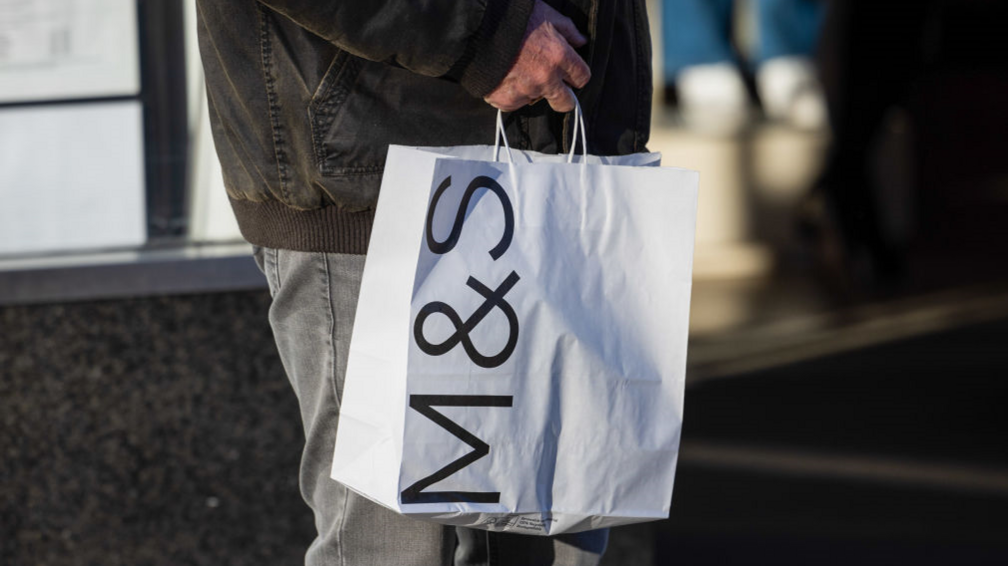M&S Christmas cheer hit by uncertain outlook for UK

- Published
Marks & Spencer (M&S) has warned about uncertainty ahead for the UK economy, overshadowing a strong Christmas for the retailer.
The company said it is facing "higher costs" from taxes such as National Insurance while "outlook for economic growth, inflation and interest rates is uncertain".
Meanwhile, Tesco confirmed that larger National Insurance contributions announced in the autumn Budget will add £250m per year to its business costs.
The British Retail Consortium (BRC) lobby group warned that Budget measures mean there is "little hope" of food prices "going anywhere but up" in the second half of 2025.
The costs of higher wages and National Insurance tax changes coming in April will be passed on to consumers, it said.
M&S chief executive Stuart Machin said the business expected higher costs: "But we want to absolutely minimise passing that through to customers both in food and in clothing."
He said that "the overall sentiment from our customers does remain flat".
The sentiment was echoed by the bakery chain Greggs which said in a trading update that "lower consumer confidence continues to [hit] High Street footfall and expenditure".
Greggs said higher wages would increase overall costs. A spokesperson said it would monitor this to see whether that will lead to price rises for customers.
Inflation
Over the key Christmas period, M&S revealed an 8.9% rise in comparable food sales while home and beauty sales grew by 1.9%.
Overall sales for the 13 weeks to 28 December increased by 5.6%.
However, M&S's share price fell more than 6% on its outlook for the economy.
The BRC forecast that food price inflation would rise from 1.8% last month to 4.2% in the latter half of this year, and that price rises will continue for vegetable oil, orange juice, butter, and coffee.
It added that overall shop prices, which have been falling, will start rising again.
But the Treasury said the independent Office for Budget Responsibility had forecast that food inflation will stay below to 2.2% this year.
Chancellor Rachel Reeves has previously said "the right thing to do was to ask businesses and the wealthiest in our country to pay a bit more".
In her autumn Budget, Reeves said the National Living Wage for over 21s would increase from £11.44 to £12.21 an hour from April and that employers' National Insurance contributions would rise from 13.8% to 15%.
Retailers hit back, warning in November that higher wages and taxes would make job cuts "inevitable", and lead to price rises and shop closures.
Tesco's chief executive Ken Murphy, who announced a strong rise in Christmas trading on Thursday, was circumspect on prices.
"What we're not saying is there will be no inflation," he said. "What we're saying is we'll do our very best to minimise the impact."
He said price rises were influenced by a number of factors including raw materials, energy costs, wages and tariffs.
"So, 'we don't know' is the short answer to what the inflationary environment looks like," he said.
Tesco reported a 4.1% rise in UK sales for the six weeks to 4 January, with food sales up 4.7%. It expects full-year operating profits to reach £2.9bn.
Greggs' Christmas sales failed to meet expectations, rising by 2.5% in the three months to 28 December, sending its share price tumbling by 11.2%.
Meanwhile, discount retailer B&M said in an update that its like-for-like sales in the UK had fallen by 2.8% in the three months to 28 December.
It also lowered the top end of its annual profit forecast. B&M's share price plunged by 8.5%.
Warning retail job cuts ‘inevitable’ after Budget
- Published19 November 2024
BRC chief executive Helen Dickinson said that modelling by the lobby group, combined with predictions from 52 chief financial officers, had led it to forecast much higher food price inflation in the latter half of the year.
"As retailers battle the £7bn of increased costs in 2025 from the Budget, including higher employer National Insurance, National Living Wage, and new packaging levies, there is little hope of prices going anywhere but up," she said.
However, the Treasury said food inflation had "fallen from a peak of 19.6% under the previous government to just 1.9%".
It said that the Labour government was "now focused on putting more money in people's pockets by growing the economy".
The lobby group said food price inflation in December was running at 1.8%, which was its lowest rate since November 2021.
The BRC uses a different basket of goods to measure inflation compared to official figures from the Office for National Statistics, but they are broadly similar.
In the run-up to Christmas, prices went down in shops overall, but this was due to non-food goods deflation, BRC said.
The pace of price rises for fresh food such as fruit and vegetables went up 1.2%, while inflation for store cupboard goods was 2.8%.

How can I save money on my food shop?
Look at your cupboards so you know what you have already
Head to the reduced section first to see if it has anything you need
Buy things close to their best before date which will be cheaper and use your freezer
Read more tips here